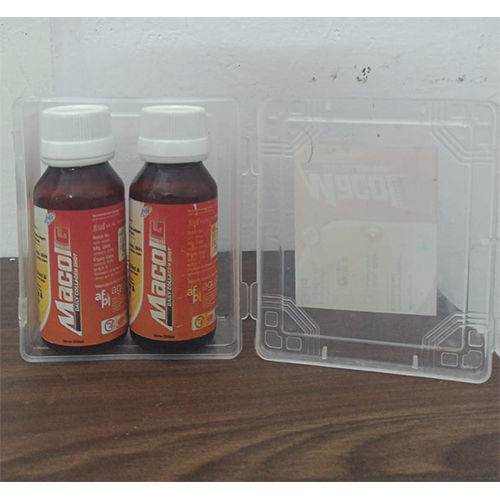
Duloxetine Hydrochloride Tablet
Product Details:
- Purity 98%
- Formulations Type General Drugs
- Formulations Form Tablets
- Gender/Age Group Adult
- Storage Instructions Dry Place
- Click to view more
Duloxetine Hydrochloride Tablet Price And Quantity
- 300 Box
- 70 INR/Box
Duloxetine Hydrochloride Tablet Product Specifications
- Adult
- Dry Place
- General Drugs
- Tablets
- 98%
Duloxetine Hydrochloride Tablet Trade Information
- Cash Advance (CA), Cash in Advance (CID)
- 300 Box Per Month
- 1 Months
- Yes
- Sample costs shipping and taxes has to be paid by the buyer
- Western Europe, Australia, Central America, Middle East, South America, Asia, Eastern Europe, North America, Africa
- All India
Product Description
Depression is associated with low levels of certain brain chemicals. These chemicals, which are collectively called neurotransmitters, carry messages between brain cells. Certain neurotransmitters—including serotonin and norepinephrine—are known to affect mood. Serotonin is sometimes called a "feel good" chemical because it is associated with positive feelings of wellbeing. Norepinephrine is related to alertness and energy.
Duloxetine is a selective serotonin (5-HT) and norepinephrine (NA) reuptake inhibitor antidepressant (SSNRI). Duloxetine affects chemicals in the brain that may become unbalanced and cause depression. The drug can help improve your mood, sleep, appetite, energy level and decrease nervousness. Duloxetine is prescribed to treat major depressive disorder and general anxiety disorder. It is also used to treat fibromyalgia (a chronic pain disorder), or chronic muscle or joint pain (such as low back pain and osteoarthritis pain). Duloxetine is also used to treat pain caused by nerve damage in people with diabetes (diabetic neuropathy). This pain relieving effects of this drug may be linked to the blockage of sodium ion channels.
Indications & Usage:
â— Treatment of major depressive disorder
â—Treatment of diabetic peripheral neuropathic pain
â—Treatment of generalised anxiety disorder
â—Fibromyalgia and chronic pain
About Composition:
Duloxetine is a selective serotonin (5-HT) and norepinephrine (NA) reuptake inhibitor antidepressant (SSNRI). Duloxetine affects chemicals in the brain that may become unbalanced and cause depression. The drug can help improve your mood, sleep, appetite, energy level and decrease nervousness. Duloxetine is prescribed to treat major depressive disorder and general anxiety disorder. It is also used to treat fibromyalgia (a chronic pain disorder), or chronic muscle or joint pain (such as low back pain and osteoarthritis pain). Duloxetine is also used to treat pain caused by nerve damage in people with diabetes (diabetic neuropathy).
It acts on serotonin transporters (SERTs) and norepinephrine transporters (NETs), which are glycoproteins present in synapses. Their function is to take extra neurotransmitters from these synapses and transfer them back to pre-synaptic nerves for further use.
By inhibiting the activity of these transporters, it increases the quantities of both neurotransmitters in the neurons. The increased concentration changes mood and enhances the alertness of a person relieving the symptoms of depression. These chemical messengers are responsible for regulating mental and physical processes other than a person's emotional state.
It has also been found to indirectly increase dopamine in the prefrontal cortex. It is also thought that the pain relieving effects of this drug may be linked to the blockage of sodium ion channels.
Mechanism Of Action:
Duloxetine binds to 5-HT and NA transporters to selectively inhibit the reuptake of these neurotransmitters from the synaptic clefts. It has a "dual mode of action". It blocks the reuptake of both 5-HT and NA with differing selectivity. Duloxetine has a 10-fold greater selectivity for 5- HT than NA transporters.
Duloxetine is also considered a less potent inhibitor of dopamine re-uptake. Duloxetine has no significant affinity for adrenergic, cholinergic, histaminergic, opioid, glutamate, or GABA receptors. It binds selectively with high affinity to both NA and 5-HT transporters and lacks affinity for monoamine receptors within the central nervous system.
Pharmacokinetics:
Absorption: Duloxetine is acid labile, and is formulated as gastro-resistant to prevent degradation in the stomach. Duloxetine has good oral bioavailability. There is an average 2-hour lag until absorption begins with maximum plasma concentrations occurring about 6 hours post dose. Food does not affect the Cmax of duloxetine, but delays the time to reach peak concentration from 6 to 10 hours.
Distribution: Duloxetine is highly bound (>90%) to proteins in human plasma, binding primarily to albumin and α1-acid glycoprotein. Volume of distribution is 1640L.
Metabolism: Duloxetine undergoes predominately hepatic metabolism via two cytochrome P450 isozymes, CYP2D6 and CYP1A2. Circulating metabolites are pharmacologically inactive.
Elimination: Duloxetine has an elimination half-life of about 12 hours (range 8 to 17 hours) and its pharmacokinetics is dose proportional over the therapeutic range. Steady-state is usually achieved after 3 days. Only trace amounts (<1%) of unchanged duloxetine are present in the urine and most of the dose (approx. 70%) appears in the urine as metabolites of duloxetine with about 20% excreted in the feces.
Side Effects:
â—Fatigue
â—Blurred vision
â—Dry mouth
â—Nausea
â—Vomiting
â—Constipation/ Diarrhea
â—High blood pressure
â—Decreased libido
â—Rash
Rare side-effects include:
â—Increased heart palpitations
â—Elevate the suicidal thoughts or impulses
Contraindications:
The following are reasons why Duloxetine tablets may not be suitable for you. Talk to your doctor before you take Duloxetine tablets if you:
â—are hypersensitive to duloxetine or any of the inactive ingredients
â—are taking medicines to treat depression
â—are taking St. John's Wort, a herbal treatment (Hypericum perforatum)
â—have kidney disease
â—have had seizures (fits)
â—have had mania
â—suffer from bipolar disorder
â—have eye problems, such as certain kinds of glaucoma (increased pressure in the eye)
â—have a history of bleeding disorders (tendency to develop bruises)
â—are at risk of low sodium levels (for example if you are taking diuretics, especially if you are elderly)
â—are currently being treated with another medicine which may cause liver damage
â—are taking other medicines containing duloxetine
Do not co-administer Duloxetine with thioridazine, triptans and other drugs acting on serotonin pathways leading to increased risk for serotonin syndrome.
Pregnancy & Breast-Feeding:
If you are pregnant or breast feeding, think you may be pregnant or are planning to have a baby, ask your doctor or pharmacist for advice before taking this medicine.
â—Tell your doctor if you become pregnant, or you are trying to become pregnant, while you are taking Duloxetine tabets. You should use Duloxetine tablets only after discussing the potential benefits and any potential risks to your unborn child with your doctor.
â—Make sure your midwife and/or doctor knows you are on Duloxetine tablets. When taken during pregnancy, similar drugs (SSRIs) may increase the risk of a serious condition in babies, called persistent pulmonary hypertension of the newborn (PPHN), making the baby breathe faster and appear bluish.
These symptoms usually begin during the first 24 hours after the baby is born. If this happens to your baby you should contact your midwife and/or doctor immediately.
â—If you take Duloxetine tablets near the end of your pregnancy, your baby might have some symptoms when it is born. These usually begin at birth or within a few days of your baby being born. These symptoms may include floppy muscles, trembling, jitteriness, not feeding properly, trouble with breathing and fits. If your baby has any of these symptoms when it is born, or you are concerned about your baby's health, contact your doctor or midwife who will be able to advise you.
â—Tell your doctor if you are breast feeding. The use of Duloxetine tablets while breastfeeding is not recommended. You should ask your doctor or pharmacist for advice.
Driving & Using Machines:
Duloxetine tablets may make you feel sleepy or dizzy. Do not drive or use any tools or machines until you know how Duloxetine tablets affect you.
Storage:
â—Keep all medicines out of the reach and sight of children.
â—Store in a cool, dry place, away from direct heat and light.

Price:
- 50
- 100
- 200
- 250
- 500
- 1000+







